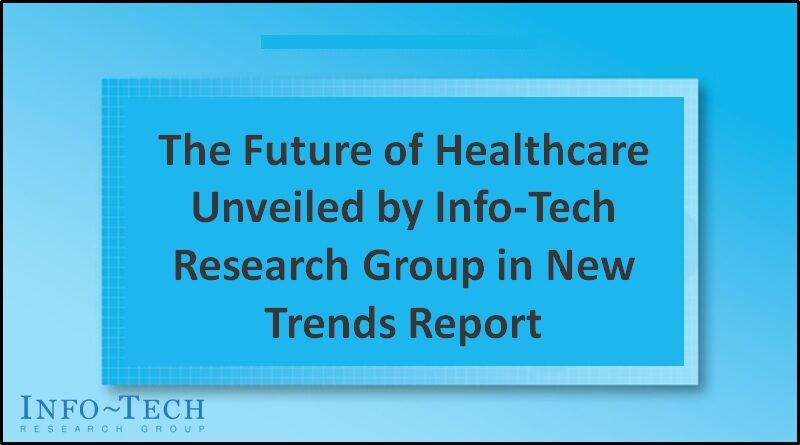The Future of Healthcare Unveiled by Info-Tech Research Group in New Trends Report
After three years of addressing the tremendous difficulties and interruptions brought on by the COVID-19 epidemic, healthcare organizations around the world are overburdened. Healthcare firms must priorities automation, connection, and flexibility to strengthen their current digital transformation capabilities in order to improve patient outcomes. Info-Tech Research Group has published a new Future of Healthcare Trends Report to assist healthcare technology leaders in digitally transforming service delivery, identifying and prioritizing viable trends, and highlighting the potential effect of these trends.
According to the firm’s research, healthcare and health organizations can change in the post-pandemic period by continuing to redefine the digital delivery of healthcare services using the lessons learned from the pandemic response.
“Healthcare organizations are under great stress as they care for an aging population and navigate the challenges of the pandemic”, “With patients looking for more advanced technology-based care options, healthcare IT leaders must stay informed about the latest innovations and trends shaping how healthcare providers and administrators deliver care.”
Rob Redford, Industry Research Practice Lead at Info-Tech Research Group
The paper from Info-Tech describes how healthcare will be automated, linked, and flexible in the future. Automation, for instance, can assist healthcare firms in improving patient care and retaining talented staff. When used in conjunction with virtual care, it can build efficient care environments and set the patient experience apart from that of other healthcare providers.
By integrating useful data from electronic healthcare records (EHRs) onto mobile devices like tablets, watches, and smartphones, connected care can be increased, offering patients more choice to choose where to receive care and to experiment with new types of virtual care.
Personal gadgets that are safe, simple to use, and incorporate consumer apps that assist lifestyle modification, remind patients to take their medications, and connect them to patient communities offer flexible and hyper-personalized care plans.
“A healthcare organization requires leadership from IT for digital transformation to succeed, especially in areas like advanced data analytics, cybersecurity, resilient infrastructure, and cloud integration.”
Rob Redford, Industry Research Practice Lead at Info-Tech Research Group
The following three high-level trends are anticipated to have an impact on the healthcare sector during the coming several years, according to the firm’s research:
- Internet of Medical Things (IoMT) – Healthcare organisations may offer an integrated and comprehensive patient experience by integrating mobile into patient care and utilising an omnichannel strategy. Healthcare businesses will be able to instal more IoMT devices and solutions thanks to the development of core networks to 5G and 6G connection.
- Purchases and Mergers – Larger healthcare organizations that survived the pandemic and successfully diversified their patient services will now seek to develop their operations by purchasing smaller healthcare providers and diversifying their service offerings.
- High-quality Home Care – It is anticipated that healthcare expenses will drop by 30% by using technology to deliver more home care through virtual care. This strategy leads to shorter hospital stays in addition to better clinical outcomes.
The paper adds that the opportunity to deliver care more sustainably exists because of the digital transformation of healthcare. The company asserts that healthcare institutions who were late to implement virtual care before the pandemic would need to pick up the pace and take advantage of fresh chances to deliver treatment in more approachable, technologically advanced ways.




